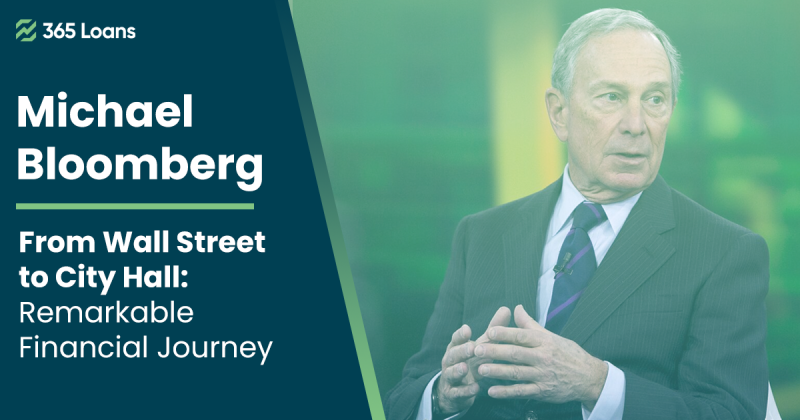Michael Bloomberg is a name that needs no introduction in the worlds of finance and politics. Born in 1942 in Massachusetts, he attended Johns Hopkins University before earning his MBA from Harvard Business School. His early career began on Wall Street, where he worked at Salomon Brothers before founding his own company, Bloomberg L.P.
The billionaire businessman has had a remarkable career that has taken him from Wall Street to City Hall, with significant achievements and contributions along the way. His journey is an inspiration for entrepreneurs, public servants, and anyone looking to make a positive impact in society.
– Michael Bloomberg Click to Tweet
In this article, we will delve into Michael Bloomberg’s life and career, examining his rise to success and the lessons that can be learned from his experiences. From his early days in finance to his leadership as mayor of New York City, we will explore the key moments and decisions that shaped his remarkable journey. Through his story, we will see the power of entrepreneurship, philanthropy, and political leadership, and how they can be used to create positive change in the world.
Early Career in Finance
Michael Bloomberg’s early career in finance began after he graduated from Harvard Business School in 1966. He secured a job at Salomon Brothers, an investment bank, where he quickly rose through the ranks. Bloomberg’s role at Salomon Brothers involved analyzing financial data and developing computer models to help traders make better investment decisions.
In 1981, Bloomberg left Salomon Brothers and founded his own company, Bloomberg L.P. Initially, the company focused on providing financial data and media services to businesses and financial institutions. However, Bloomberg saw an opportunity to revolutionize the financial industry by creating a more efficient and user-friendly platform for financial data.
This led to the development of the Bloomberg Terminal, a computer software system that provided real-time financial data, news, and analysis to traders, analysts, and investors. The Terminal quickly became a must-have tool for financial professionals, providing them with the information they needed to make informed investment decisions. Today, the Bloomberg Terminal remains one of the most widely used financial tools in the world.
Bloomberg faced challenges in convincing customers to adopt his new product, but his reputation in the industry and focus on providing top-quality service and support helped establish Bloomberg L.P. as a leading provider of financial data and software.
The growing demand for more efficient and effective financial tools provided a key opportunity for Bloomberg. The complexity of the financial industry required a reliable and comprehensive platform for financial data, and the Bloomberg Terminal provided a powerful and innovative solution.
Entrepreneurial Success and Philanthropy
Michael Bloomberg’s entrepreneurial success continued as he grew Bloomberg L.P. into a global media and financial services company. Under his leadership, the company expanded its offerings beyond financial data and software to include news, media, and other financial services. Bloomberg L.P. now operates in over 170 countries and is valued at over $50 billion.
Bloomberg’s success as an entrepreneur has also allowed him to give back through his philanthropic initiatives. He founded Bloomberg Philanthropies in 2006, which has donated over $11 billion to various causes around the world. Some of the initiatives supported by Bloomberg Philanthropies include environmental conservation, public health, education, and the arts.
One notable example of Bloomberg’s philanthropic work is his efforts to combat climate change. He has donated over $500 million to support the transition to clean energy, and has advocated for policies to reduce carbon emissions and promote sustainable development.
Michael Bloomberg’s entrepreneurial success and philanthropic initiatives demonstrate the power of innovation, perseverance, and social impact. His leadership in the financial industry and his commitment to philanthropy provide valuable lessons for anyone seeking to make a difference in the world.
Political Career and Leadership Style
After his success in the business world, Michael Bloomberg turned his attention to politics and decided to run for mayor of New York City in 2001. He won the election and served three terms as mayor from 2002 to 2013. As mayor, Bloomberg accomplished many things, such as reducing crime rates, improving public health, and promoting economic growth. He also faced significant challenges, such as the aftermath of the 9/11 attacks, the 2008 financial crisis, and Hurricane Sandy.
Bloomberg’s leadership style as mayor was characterized by his pragmatic approach to governance. He was known for relying on data and analysis to make decisions, and for being willing to take bold action to address pressing issues. He also focused on improving efficiency and accountability in city government, streamlining bureaucracy, and implementing performance-based evaluations.
While he faced some criticism for his policies and leadership, his accomplishments as mayor of New York City have left a lasting impact on the city and provide valuable lessons for public servants.
“You must first be willing to fail – and you must have the courage to go for it anyway.”
Michael Bloomberg
Criticisms and Controversies
While Michael Bloomberg’s tenure as mayor of New York City was marked by many successes, he also faced criticism and controversies during his time in office.
One of the most significant criticisms of Bloomberg’s policies was the “stop and frisk” program, which many argued was discriminatory and violated civil rights. Bloomberg defended the program as a necessary tool for reducing crime rates, but it faced numerous legal challenges and was ultimately ruled unconstitutional in 2013.
Bloomberg was also criticized for his handling of the Occupy Wall Street protests in 2011, as well as his support for the construction of a mosque near Ground Zero. He was also criticized for his support of charter schools, which many saw as a threat to public education.
In addition to criticisms of his policies, Bloomberg faced controversy over his personal and professional life. He was accused of making sexist comments and fostering a hostile work environment for women at his company, Bloomberg L.P. He was also accused of using his wealth to buy political influence and silence his critics.
Bloomberg has responded to these criticisms by acknowledging his mistakes and vowing to do better. He has apologized for his comments and behavior towards women and has pledged to improve the workplace culture at his company. He has also defended his policies as mayor and argued that they were necessary for the city’s safety and prosperity.
Michael Bloomberg’s criticisms and controversies demonstrate the importance of accountability and transparency in public service. While he achieved many successes during his career, his mistakes and missteps serve as important reminders that leaders must be willing to listen to criticism and learn from their mistakes.
Legacy and Impact
Michael Bloomberg’s legacy and impact can be felt across many different areas, including finance, entrepreneurship, and politics. His achievements have had a lasting impact on these fields, and continue to shape the way we think about leadership and innovation today.
In the financial world, Bloomberg’s creation of the Bloomberg Terminal revolutionized the way traders and investors access financial information. Today, the Terminal is used by thousands of financial professionals around the world and has helped to democratize access to financial data.
As an entrepreneur, Bloomberg’s success in building a global media and financial services company has inspired countless others to pursue their own entrepreneurial dreams. His emphasis on innovation, efficiency, and data-driven decision-making continues to be a model for startups and established companies alike.
In the political world, Bloomberg’s three terms as mayor of New York City left a lasting impact on the city’s infrastructure, public health, and economic growth. His policies and initiatives have been replicated in cities around the world, and his emphasis on evidence-based decision-making has become a hallmark of effective governance.
Conclusion
In conclusion, Michael Bloomberg’s journey from Wall Street to City Hall is a remarkable success story that offers many valuable lessons for aspiring entrepreneurs and public servants. Throughout his career, he demonstrated a commitment to innovation, efficiency, and data-driven decision-making, as well as a dedication to philanthropy and social impact.
From his early days at Salomon Brothers to the founding of Bloomberg L.P. and his tenure as mayor of New York City, Bloomberg’s achievements have had a lasting impact on the worlds of finance, entrepreneurship, and politics. Despite facing criticisms and controversies along the way, he has remained steadfast in his commitment to making a positive difference in the world.
As readers reflect on Bloomberg’s journey, they can apply the lessons learned in their own lives and careers. Whether pursuing entrepreneurial ventures, engaging in public service, or promoting social impact, they can draw inspiration from Bloomberg’s emphasis on innovation, efficiency, and data-driven decision-making, as well as his commitment to making a positive difference in the world.







